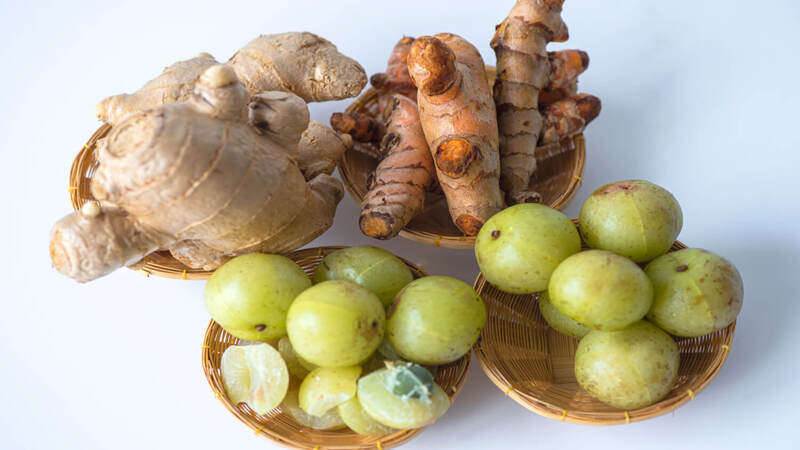
During pregnancy, whatever we taste, smell, touch, see or hear should aid in developing a healthy baby with a sound mind. Ayurveda enhances this thought and advocates for following an Ayurvedic lifestyle like including Amla during pregnancy. It is said that amla during pregnancy will benefit both mother and child.
Other names of Amla include ‘Usiri Kaya’ in Telugu, ‘Nellikai’ in Tamil, ‘Nelli’ in Malayalam, ‘Avala’ in Marathi, ‘Amlaki / Amala’ in Bengali, and ‘Anla’ in Oriya. One of the best things about this winter fruit is that we are able to use its benefits throughout the year.
Eating Amla (Indian Gooseberry) During Pregnancy
According to Ayurveda, the Indian gooseberry or Amla during pregnancy has an inevitable role throughout this period of a woman. Its benefits are also passed down to us from our older generations. It is the main ingredient of many of the Ayurvedic medicines like chyawanaprash, arista, choornas, etc.
Although not very appealing in its flavor, we all would have tasted this “wonder fruit” because it is very commonly available in India.
This is possible because its nutritional value does not get destroyed even if it is stored in powdered form. Amla is an excellent blood purifier and is wise to take it throughout your pregnancy as it helps to stay detoxified.
Another great thing about Amla is it does not have any side effects. So it is safe to eat Amla during pregnancy.
11 Amazing Benefits of Eating Amla During Pregnancy

Amla is an excellent source of Vitamin C, with ample fiber and potassium. It is highly noted for its rejuvenating properties. Not only is it packed with vitamins and minerals, but it is also rich in antioxidants and dietary fiber.
1. Helps to Relieve Fatigue and Tiredness
Amla is known for its excellent rejuvenating property. This will help in regenerating energy in the cells, thus reducing tiredness. Drinking amla juice or eating Amla has been proven to reduce morning sickness and is good for the health of teeth. Its sweet and sour taste helps to diminish the nauseating feeling throughout the early trimester of pregnancy.
2. Preventing Constipation
Amla is high in fiber and we can also say it is a moderate laxative. This helps to regularize bowel movements and prevent constipation, which is a common problem during pregnancy.
[Read : Pregnancy and Constipation]
3. Improves Digestion
Amla is found to stimulate the production of gastric juices, therefore, improving digestion and permitting the absorption of more nutrients. Eating Amla regularly during pregnancy helps fight indigestion and gas formation.
4. Enhancing Immunity
The antibacterial property of Amla and its high vitamin C content helps to fight infections like common cold and urinary tract infections, which usually show up during the pregnancy.
5. Maintaining Normal Blood Pressure
Vitamin C than found in abundance in this berry makes the blood vessels dilate thus helps in sustaining normal blood pressure.
6. Eradicating Anemia
Amla is a rich source of vitamin C and iron. With the help of vitamin C, iron gets absorbed easily by the blood and, therefore, hemoglobin level is well maintained. So, daily eating Amla will help to fight anemia.
7. Detoxification
Intake of Amla during pregnancy helps in increasing the frequency and quantity of urination because of its high water content. This berry also has antioxidant properties which help to eliminate the free radicals. This helps in flushing out the toxins from the body.
8. Helps in Edema
Amla has anti-inflammatory properties. Thus, regular consumption of Amla during pregnancy helps to reduce the swelling of hands and feet during pregnancy.
[Read : Edema – Swollen Legs and Feet During Pregnancy]
9. Helps to Eliminate Gestational Diabetes
Gestational diabetes is a condition found during pregnancy when pregnancy hormones interfere with the action of insulin in the mother’s body. This results in the development of diabetes in a mother who doesn’t have a previous history of diabetics.
The anti-diabetic quality of gooseberry will help in reducing the chances of getting gestational diabetes.
10. Amla is High in Calcium
The calcium c content of this fruit is quite noticeable. Calcium is essential for the development of your baby’s teeth and bones. Regular consumption of gooseberries leads to a sufficient intake of calcium.
11. Some of the Other Benefits of Eating Amla During Pregnancy are
- Consuming amla juice is said to improve the brainpower of the fetus, although it is not scientifically proven yet.
- It is said that if you eat Amla regularly during pregnancy the chances of undergoing preterm labor decreases.
- Amla helps to maintain the perfect lipid profile which is highly favorable during pregnancy.
Is it Safe to Drink Amla Juice During Pregnancy?

Yes, drinking amla juice is considered safe during the course of pregnancy. However, the packaged Amla juice available in the market is either sweetened or has added preservatives; both are not preferred when you are pregnant.
You can crush its pulp and prepare amla juice at home itself. Mix it with the same amount of water and consume. Five to ten ml of amla juice per day is enough for a pregnant woman. If you still want to buy amla juice from the market, make sure you buy from a reputed brand and that the package has been stored properly.
Do not buy locally made juice packs and check the expiry/best before dates, seal, and manufacturing. Remember, packaged foods contain less nutrition than fresh foods, and Amla is no exception.
Side Effects of Amla During Pregnancy
Although eating Amla during pregnancy has multiple benefits, excess intake without your doctor’s advice can bring about:
- Bleeding during pregnancy.
- Gastric issues like indigestion, constipation, diarrhea, and dehydration, as well as an upset stomach.
- Cold or cough or aggravate existing cold or cough as amla has a cooling property.
Tips to Include Amla in Your Diet
Some women crave amla for its raw, tangy flavor. Others, on the other hand, may dislike its sour flavor and prefer to consume it in other forms. Here are some ideas for including amla in your diet.
- Amla Juice
- Picked amla
- Amla powder, which can be incorporated while making curries
- Amla salad.
- Sweets like amla murabba and amla candy
- Amla supari, which can potentially quench morning sickness
Indian Gooseberry Over Ginger For Problems of Indigestion During Pregnancy

It is true that ginger helps to cure indigestion problems and gas formation. But ginger has a warming effect, whereas gooseberry has a cooling effect on your body. During pregnancy, it is important to avoid foods that induce heat in the body.
Hence, it is recommended to eat gooseberries for the gastric issues that arise during pregnancy.
[Read : What Are Heat Inducing Foods? Do They Cause Miscarriage?]
Can I Eat Cooked Amla?
Boiling the Indian gooseberries before eating is not advisable because all the vital nutrients will get lost through this process. If you prefer not to eat raw amla fruit, then opt for steaming. But we suggest eating raw gooseberries or drinking Amla juice, which is highly beneficial.
If you don’t like it, mix one to two teaspoons of amla powder in some water and drink it. Amla powder retains all the goodness of fresh Amla. You can powder-dry Amla in your house itself and store it in an airtight container. This will guarantee its quality.
When Should I Avoid Eating Amla During Pregnancy?
Amla has no side effects. But refrain from eating Amla during pregnancy if you are suffering from diarrhea for some reason or if you already have a cold or a cough.
This is because Amla is a moderate laxative; eating it when you have loose motions is not a good idea. Similarly, Amla has a cooling effect on your body, which is not good when your body is already being affected by a cold or a cough.
FAQ’s
1. What is the Best Time to Eat Amla During Pregnancy?
Even though there is no scientific evidence to support this, mornings are the best time to consume Amla while pregnant. However, there is no harm in consuming Amla at any other time of day as well.
2. How Many Amla are Safe During Pregnancy?
Two fresh Amla during pregnancy per day won’t do any harm. If you are taking Amla in powder form, 4gms – that is equal to one teaspoon – daily is enough. Likewise, 5-10 ml of pure amla juice is also fine to take during pregnancy. However, your doctor will be the right person to direct you here.
3. Can I Consume Salted Amla During Pregnancy?
It is best to limit salt intake and avoid heavily salted foods during pregnancy. Increased intake of sodium can potentially trigger stomach problems, disrupt the fluid-electrolyte balance, and increase the risk of hypertension.
4. Should I Eat Alma Fruit or Have The Powder While Pregnant?
Amla fruit can be a little bitter to taste. Many pregnant women might prefer this. The taste can help combat nausea too.
5. Is Amla Powder Good During Pregnancy?
Yes it is. However, check with your doctor for dosage recommendation. You can have it with plain water or other foods too.
6. Can Eating Amla During Pregnancy Affect My Diabetes?
Yes it can. But in a good way. Amla can bring down your sugar levels.
7. Should I Consume Amla Regularly During Pregnancy?
Yes, if you like it. It has a lot of benefits. It can even help with your joint pains in pregnancy.
Read Also: Grapes During Pregnancy – Are Safe To Eat?

